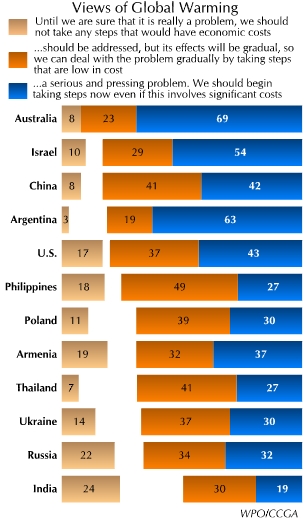A new international poll finds worldwide agreement that climate change is a threat. Opinions are split, however on the nuts and bolts — in particular, whether to act immediately and whether countermeasures are worth the investment. Even so, a window of opportunity seems to have opened that would allow leaders with bold solutions to spark international cooperation and make real strides. The poll included 17 countries, representing more than 55 percent of the world population (though not all the questions were asked in each of the countries). Western European countries and Canada* were not included.
While global opinion trends are encouraging, the United States — the world’s largest emitter of greenhouse gases — has some catching up to do. That is to say, an attitude adjustment is in order:

- A majority of people in 10 nations questioned, including China, Iran, South Korea, and Mexico, view global warming as a critical threat. In many cases, these numbers represent a rise of around 20 points since 2003.
- But not the U.S. About 46 percent of Americans surveyed say global warming is critical, while a whopping four in 10 label it “an important but “not critical threat” (emphasis mine). A similar international survey conducted in 2005 showed 49 percent of Americans in agreement that global warming is “very serious” — a slightly different question; and while domestic research does consistently show increasing concern among U.S. respondents — albeit gradual, the middling levels of concern released this week are right in line with data collected in recent months by American firms.)
- Some comparisons: In China, 47 percent view climate change as critical. In Iran, 61 percent; South Korea: 67 percent; Mexico: 70 percent.
- And, among 13 countries, the U.S. ranked fifth in the number of respondents who remain unsure that global warming is really a problem (17 percent).
But let’s focus on the good news: in 9 of 10 nations surveyed, respondents agreed action should be taken to combat global warming. As Stephen Kull, chief analyst of this new data, explained it to the Associated Press:
If you think about the fact that just two decades ago, hardly anyone knew what climate change or global warming was, and now you have people all around the world — even in developing countries — really absorbing that there is something to address here. It’s really quite phenomenal that this kind of change can happen.
However, the numbers certainly don’t mean the scales have tipped toward quick action, or that world populations have seen the light and recognized the enormous long-term payoffs of immediate investment (even while plenty has been reported about the price tags associated with it. Here’s the split in the U.S.:
- Forty three percent of American respondents are in favor of “taking steps now even if this involves significant costs.” Not too shabby.
- But, then there’s this: Fully 37 percent of Americans surveyed believe the effects of global warming will be gradual, agreeing that “we can deal with the problem gradually by taking steps that are low in cost.”
Back to good news (here’s that window of opportunity I was talking about):
- Majorities or pluralities in five out of five developing countries believe that if developed countries are willing to provide substantial aid, less-developed countries should make a commitment to limit their greenhouse gas emissions.
- On the flip side, majorities in three of three developed countries believe countries like their own should provide “substantial aid” to less-developed countries willing to “make a commitment to limit their greenhouse gas emissions,” including 64 percent of Americans. Wow!
- And, in ten of 11 countries, large majorities believe international trade agreements should be required to maintain standards for protection of the environment.
All in all, considering these global attitudes and increased media attention to the problem, the world’s stage is set for the U.S. to step up and begin championing climate solutions for industrialized and developing nations alike.
And, considering a history of technological innovation and a national spirit of ingenuity that has taken humankind to the moon and to cyberspace — among other big breakthroughs — it would be surprising if this time around, instead of answering an international call to duty, Americans chose middle-of-the-road over a usual place in the spotlight.
*A note about Canada: While not included in this round of polling, Canada has consistently outpaced the U.S. in attitudes about climate change. In the 2005 survey of 33 nations I mentioned earlier, Canadians who agreed climate change is “somewhat” and “very” serious hit the international average dead on at 90 percent. The U.S. came in fully 14 points below the international average (76 percent); worse, Americans charted the highest number of respondents among all 33 countries who said climate change is “not serious” — fully 21 percent. In Canada, by contrast, only 9 percent said it’s “not serious.”

